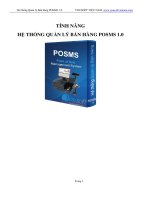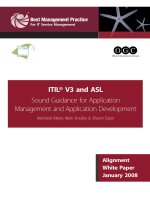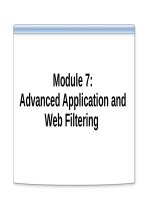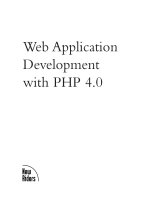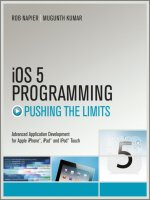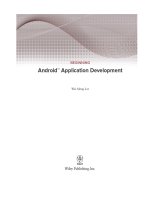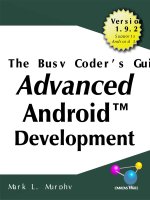6629 module PM advanced application development 1 ver 1 0
Bạn đang xem bản rút gọn của tài liệu. Xem và tải ngay bản đầy đủ của tài liệu tại đây (174.52 KB, 16 trang )
Module
Presenter’s Manual
for
Advanced Application
Development - I
Curriculum Code: 6629
Effective from: Feb 2014
Ver. 1.0
Amendment Record
Version No.
1.0
DM1
Effective Date
Feb - 2014
Change
New
© 2014 Aptech Limited
Replaced
Pages
-
Table of Contents
Sr.
Details
No.
Page
No.
1.
Introduction
1
2.
Information on Module Session Allocation
4
3.
Week-wise Session Schedule
5
4.
Session Coverage
6
5.
Library References
11
DM1
© 2014 Aptech Limited
Presenter’s Manual
Advanced Application Development - I
1. Introduction
At the end of this course, students will be able to:
DM1
Explain JFC and Swing
Explain AWT
State the benefits of using Swing over AWT
Explain MVC architecture
Describe Separable Model Architecture
Describe container and state its needs
Describe JFrame class and its methods
Explain JApplet class and its methods
Describe JPanel class and its methods to create and display it
Describe and explain various lightweight components
Describe the steps to create Swing application in NetBeans IDE
Explain concurrency in Swing
Explain JScrollPane and its methods
Explain JSlider and its methods
Explain event handling of JSlider
Describe JProgressBar and its methods
Explain event handling of JprogressBar
Describe JFormattedTextField
Describe JEditorPane and JTextPane
Explain ImageIcon and Border API
Identify and explain the need of dialog boxes
Identify and explain the different types of JOptionPane
Explain JDialog and its methods
State the need and purpose of layout manager
Explain different types of layout manager
Describe the FlowLayout manager
Explain how to create and add components to FlowLayout
Describe the BorderLayout manager
Describe the GridLayout manager
Describe the CardLayout manager
Describe the GridBagLayout manager
Explain BoxLayout and SpringLayout
Explain GroupLayout
Explain Dimension class
Describe JMenuBar and its methods
Describe and explain JMenu and JMenuItem
Describe and explain JCheckBoxMenuItem and JRadioButtonMenuItem
Describe JPopupMenu and its methods
Explain JFileChooser and its use
Explain and state the syntax of the methods of JFileChooser
Explain how to filter files in JFileChooser and also how to subclass it
Explain JToolBar
State the syntax of the methods of JToolBar
Explain JColorChooser, its use, and how to create it
List and explain methods and event handling for JColorChooser
Explain JList, its use, and how to create it
© 2014 Aptech Limited
Presenter’s Manual
Advanced Application Development - I
List and explain methods and event handling for Jlist
Explain JComboBox, its use, and how to create it
List and explain methods and event handing of JComboBox
Explain JSplitPane, its use, and how to create it
Explain how to add, configure, and display a JSplitPane
Explain JTabbedPane, its use and how to create it
Explain how to add and display a JTabbedPane
Explain event handling for JSplitPane and JTabbedPane
Explain JTable
Explain how to create a JTable with a custom data model
Explain event handing of JTable
Explain JTree
Explain how to add, configure, and display a JTree
Explain event handing of JTree
Explain concept of Drag and Drop
Explain TransferHandler class
Explain how to import and export data
Explain the need of Internationalization
Explain the concept of Localization
Describe how to create a properties file to store locale-specific data
Describe how to define a Localefor a country
Explain how to use the ResourceBundle class
Explain how to retrieve locale-specific data from the properties file
Explain the need and procedurefor formatting numbers, currencies, and
percentages
Explain the need and procedure for formatting Date and Time
Explain the need and procedure for using the MessageFormat class
Explain the basic concept of networking
Explain communicatio using Transmission Control Protocol (TCP)
Explain URLConnection class
Explain Socket and ServerSocket class
Explain Datagram
Explain Network Interface
Explain Cookie
Introduction to RMI
Explain RMI rrchitecture
Explain the steps to implementing RMI
Describe the JavaMail API
Describe the various mail protocols
Explain the concept of a Session
Describe how to create a Message
Identify the steps for creating and sending a message
Discuss the steps required for reading a message
Discuss the steps required for replying to a message
Note: Advanced Programming in Java – I refer to ‘Distributed Computing in
Java’ and it will be delivered using the New Training Methodology.
DM1
© 2014 Aptech Limited
Presenter’s Manual
Advanced Application Development - I
2. Information on Session Allocation
Module
Advanced Application
Development – I
Theory
(No. of Hrs)
12
Lab
(No. of Hrs)
12
Total
(No. of Hrs)
24
Throughout this Presenter’s Manual, the module Advanced Application Development –
I will be referred to as AAD1.
DM1
© 2014 Aptech Limited
Presenter’s Manual
Advanced Application Development - I
3. Module Deliverables available on OnlineVarsity
URL:
Faculty account: contact with GL
Student account:
o Account: student’s email
o Password: portal enrolment ID (default)
To aid the teaching process, following are the deliverables
Faculty Deliverables: Presenter Manual (PM)
To aid the learning process, following are the deliverables
Student Deliverables: Learner’s Guide (eBook)
Resources available on OnlineVarsity for Students:
Feature - Description/Functionality
Download Book - Student has the option to download the subject
related e-book and read offline.
Glossary - Student can access a list of subject related specialized
words with their definitions.
FAQ - Student can access frequently asked questions and their
answers.
Show Me How - Student can view a step-wise
simulation/demonstration of the module related topics.
Let Me Try - Student can practice a step-wise
simulation/demonstration of the module related topics.
DM1
© 2014 Aptech Limited
Presenter’s Manual
Advanced Application Development - I
Practice 4 Me - Student can test and evaluate their understanding of
module related topics.
Work Assignments - Student can solve scenario based lab
assignments (Hands-on). The faculty will evaluate and give their
feedbacks.
Download Source code/Files – Student can download courseware
related source files.
References - Student can access additional subject related material
for reading.
Feedback - Student can provide feedback on the course material.
Ask to Learn – Student can submit subject related technical queries.
Queries submitted will be directed to the particular course
coordinator/head.
DM1
© 2014 Aptech Limited
Presenter’s Manual
Advanced Application Development - I
4. Week-wise Session Schedule
•
•
•
A Session has duration of 2 hrs
The Concepts session is to be conducted in the classroom
Lab session is to be conducted in the lab
Delivery scheme 1: 4 session per week
Week
Day 1
Day 2
Day 3
Day 4
1
Session 1
AAD1 – T1
Session 2
AAD1 – L1
Session 3
AAD1 – T2
Session 4
AAD1 – L2
2
Session 5
AAD1 – T3
Session 6
AAD1 – L3
Session 7
AAD1 – T4
Session 8
AAD1 – L4
3
Session 9
AAD1 – T5
Session 10
AAD1 – L5
Session 11
AAD1 – T6
Session 12
AAD1 – L6
Delivery scheme 2: 6 session per week
Week
1
2
Day 1
Day 2
Session 1
AAD1 – T1
Session 3
AAD1 – T2
Session 5
AAD1 – T3
Session 2
AAD1 – L1
Session 4
AAD1 – L2
Session 6
AAD1 – L3
Session 7
AAD1 – T4
Session 9
AAD1 – T5
Session 11
AAD1 – T6
Session 8
AAD1 – L4
Session 10
AAD1 – L5
Session 12
AAD1 – L6
AAD1 (DCJ): Advanced Application Development – I
T: Theory Session, L: Lab Session
DM1
Day 3
© 2014 Aptech Limited
Presenter’s Manual
Advanced Application Development - I
5. Session Coverage
Session
No.
Session
Title
1
Session 1
AAD1 – T1
Session Details
All the topics as listed below from
Session 1 and Session 2 of
Distributed Programming in Java
book should be covered in this
session.
Session 1 – Introduction to
Swing
Explain JFC and Swing
Explain AWT
State the benefits of using Swing over
AWT
Explain MVC architecture
Describe Separable Model Architecture
Describe container and state its needs
Describe JFrame class and its methods
Explain JApplet class and its methods
Describe JPanel class and its methods
to create and display it
Describe and explain various
lightweight components
Describe the steps to create Swing
application in NetBeans IDE
Explain concurrency in Swing
Session 2 – Basic Swing
Components
Explain JScrollPane and its methods
Explain JSlider and its methods
Explain event handling of Jslider
Describe JProgressBar and its methods
Explain event handling of JprogressBar
Describe JFormattedTextField
Describe JEditorPane and JTextPane
Explain ImageIcon and Border API
Identify and explain the need of dialog
boxes
Identify and explain the different types
DM1
© 2014 Aptech Limited
Deliverables’
Mapping
Distributed
Programming in Java
Session 1
Session 2
Presenter’s Manual
Advanced Application Development - I
2
3
Session 2
AAD1 – L1
Session 3
AAD1 – T2
The workshop lessons of Session 1
and Session 2 of Distributed
Programming in Java course should
be covered in this session.
All the topics as listed below from
Session 3 and Session 4 of
Distributed Programming in Java
book should be covered in this
session.
Session 3 – Layout Managers
Distributed
Programming in Java
(OnlineVarsity)
Session 1
Session 2
Distributed
Programming in Java
Session 3
Session 4
State the need and purpose of layout
manager
Explain different types of layout
manager
Describe the FlowLayout manager
Explain how to create and add
components to FlowLayout
Describe the BorderLayout manager
Describe the GridLayout manager
Describe the CardLayout manager
Describe the GridBagLayout manager
Explain BoxLayout and SpringLayout
Explain GroupLayout
Explain Dimension class
Session 4 – Menu Components
Describe JMenuBar and its methods
Describe and explain Jmenu and
JMenuItem
Describe and explain
JCheckBoxMenuItem and
JRadioButtonMenuItem
Describe JPopupMenu and its methods
Explain JFileChooser and its use
Explain and state the syntax of the
methods of JFileChooser
Explain how to filter files in JFileChooser
and also how to subclass it
Explain JToolBar
4
Session 4
AAD1 – L2
State the syntax of the methods of
The workshop lessons of Session 3
and Session 4 of Distributed
Programming in Java course should
be covered in this session.
Distributed
Programming in Java
(OnlineVarsity)
Session 3
Session 4
DM1
© 2014 Aptech Limited
Presenter’s Manual
Advanced Application Development - I
Session
No.
Session
Title
5
Session 5
AAD1 – T3
Session Details
All the topics as listed below from
Session 5 and Session 6 of
Distributed Programming in Java
book should be covered in this
session.
Session 5 – Lists and Panes
Deliverables’
Mapping
Distributed
Programming in Java
Session 5
Session 6
Explain JColorChooser, its use, and how
to create it
List and explain methods and event
handling for JcolorChooser
Explain JList, its use, and how to create
it
List and explain methods and event
handling for JList
Explain JComboBox, its use, and how to
create it
List and explain methods and event
handing of JComboBox
Explain JSplitPane, its use, and how to
create it
Explain how to add, configure, and
display a JSplitPane
Explain JTabbedPane, its use and how
to create it
Explain how to add and display a
JTabbedPane
Explain event handling for JSplitPane
and JTabbedPane
Session 6 – Advanced Swing
Components
Explain JTable
Explain how to create a JTable with a
custom data model
Explain event handing of JTable
Explain Jtree
Explain how to add, configure, and
display a JTree
Explain event handing of Jtree
6
DM1
Session 6
AAD1 – L3
Explain concept of Drag and Drop
The workshop lessons of Session 5
and Session 6 of Distributed
Programming in Java course should
be covered in this session.
© 2014 Aptech Limited
Distributed
Programming in Java
(OnlineVarsity)
Session 5
Session 6
Presenter’s Manual
Advanced Application Development - I
Session
No.
Session
Title
7
Session 7
AAD1 – T4
Session Details
All the topics as listed below from
Session 7 of Distributed
Programming in Java book should
be covered in this
session.
Session 7 –
Internationalization
Deliverables’
Mapping
Distributed
Programming in Java
Session 7
Explain the need of
Internationalization
Explain the concept of Localization
Describe how to create a properties
file to store locale-specific data
Describe how to define a Locale for a
country
Explain how to use the
ResourceBundle class
Explain how to retrieve localespecific data from the properties file
Explain the need and procedure for
formatting numbers, currencies, and
percentages
Explain the need and procedure for
formatting Date and Time
Explain the need and procedure for
using the MessageFormat class
8
Session 8
AAD1 – L4
The workshop lessons of Session 7
of Distributed Programming in Java
course should be covered in this
session.
Distributed
Programming in Java
(OnlineVarsity)
Session 7
DM1
© 2014 Aptech Limited
Presenter’s Manual
Advanced Application Development - I
Session
No.
Session
Title
9
Session 9
AAD1 – T5
Session Details
All the topics as listed below from
Session 8 of Distributed
Programming in Java book should
be covered in this
session.
Session 8 – Networking
Deliverables’
Mapping
Distributed
Programming in Java
Session 8
Explain the basic concept of
Networking
Explain communicatio using
Transmission Control Protocol (TCP)
Explain URLConnection class
Explain Socket and ServerSocket
class
Explain Datagram
Explain Network Interface
10
Session
10
AAD1 – L5
Explain Cookie
The workshop lessons of Session 8
of Distributed Programming in Java
course should be covered in this
session.
Distributed
Programming in Java
(OnlineVarsity)
Session 8
11
Session
11
AAD1 – T6
All the topics as listed below from
Session 9 and Session 10 of
Distributed Programming in Java
book should be covered in this
session.
Session 9 – Remote Method
Invocation
Introduction to RMI
Explain RMI rrchitecture
Explain the steps to implementing
RMI
Session 6 – JavaMail
Describe the JavaMail API
Describe the various mail protocols
Explain the concept of a Session
Describe how to create a Message
Identify the steps for creating and
sending a message
Discuss the steps required for
reading a message
Discuss the steps required for
replying to a message
DM1
© 2014 Aptech Limited
Distributed
Programming in Java
Session 9
Session 10
Presenter’s Manual
Advanced Application Development - I
12
DM1
Session
12
AAD1 – L6
The workshop lessons of Session 9
and Session 10 of Distributed
Programming in Java course
should be covered in this session.
© 2014 Aptech Limited
Distributed
Programming in Java
(OnlineVarsity)
Session 9
Session 10
Presenter’s Manual
Advanced Application Development - I
6. Library References
Java Swing, 2nd Edition by Marc Loy, Robert Eckstein, Dave Wood, James Elliott,
Brian Cole
Java RMI (Java Series) by William Grosso
JavaMail API by Elliotte Rusty Harold
~~ End of Document ~~
DM1
© 2014 Aptech Limited
